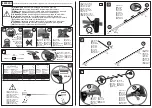
1
2
3
4
5
6
7
8
In an Emergency
163
Vehicle Overheating
The vehicle overheating actually refers to
the extremely high water temperature of the
engine. If the warning light of the engine
temperature flashes, it indicates the over-
heating engine, and it is necessary to han-
dle the problem according to the following
procedures:
1.
Safely drive your vehicle off the road to
a safe place, then stop it and turn on the
emergency flash light. Shift the trans-
mission to the neutral position ( by man-
ual) and step on the parking brake. If
the air conditioner is in use, please turn
it off.
2.
If the cooling liquid or steam erupts from
the radiator or the expansion tank,
please shut down the engine. Open the
engine hood after the steam fades.
Without the ejection of cooling liquid or
steam, keep the engine running and
confirm the cooling fan is in operation. If
not, turn off the "Start" switch.
3.
Take a visual inspection to make sure
whether the engine drive belt (water
pump belt) is fractured or flabby. Check
whether there is obvious cooling fluid
leakage under the radiator, hose and
vehicle. If there are some water droplets
from the air conditioner in use, however,
this is a normal phenomenon.
4.
If the engine drive belt is fractured or
there is cooling liquid leakage, immedi-
ately shut down the engine and notify
the Geely Service Station or turn to a
qualified repair shop.
5.
If the engine drive belt is OK and there
is no obvious water leakage, please
check the cooling liquid expansion tank.
If the expansion tank is dry, please add
some cooling liquid to the tank to about
a half height under the state of the
engine in operation.
6.
When the temperature of the engine
cooling liquid drops to the normal one,
check again the liquid level of the cool-
ing liquid in the expansion tank. If nec-
essary, add the cooling liquid to a half
height. The severe loss of cooling fluid
indicates that there is leakage in the
system. It is necessary to ask the Geely
Service Station or a qualified repair
shop to check as soon as possible.
7.
After parking in summer, the cooling fan
is often automatically running and even
runs for a long time, this situation is nor-
mal. When the engine cools down and it
does not need the cooling fan to work
any more, the cooling fan will automati-
cally shut down.
In order to avoid injuries, you must
keep the hood closed until there is no
steam, the outflow of the steam or cooling
fluid indicates that the pressure in the
engine is high.
When the engine is running, keep your
hands and clothes away from the running
fan and the engine drive belt.
When the temperatures of the engine and
radiator are high, do not remove the radia-
tor cover. The extrusive high temperature
steam and liquid can cause serious injury.
















































